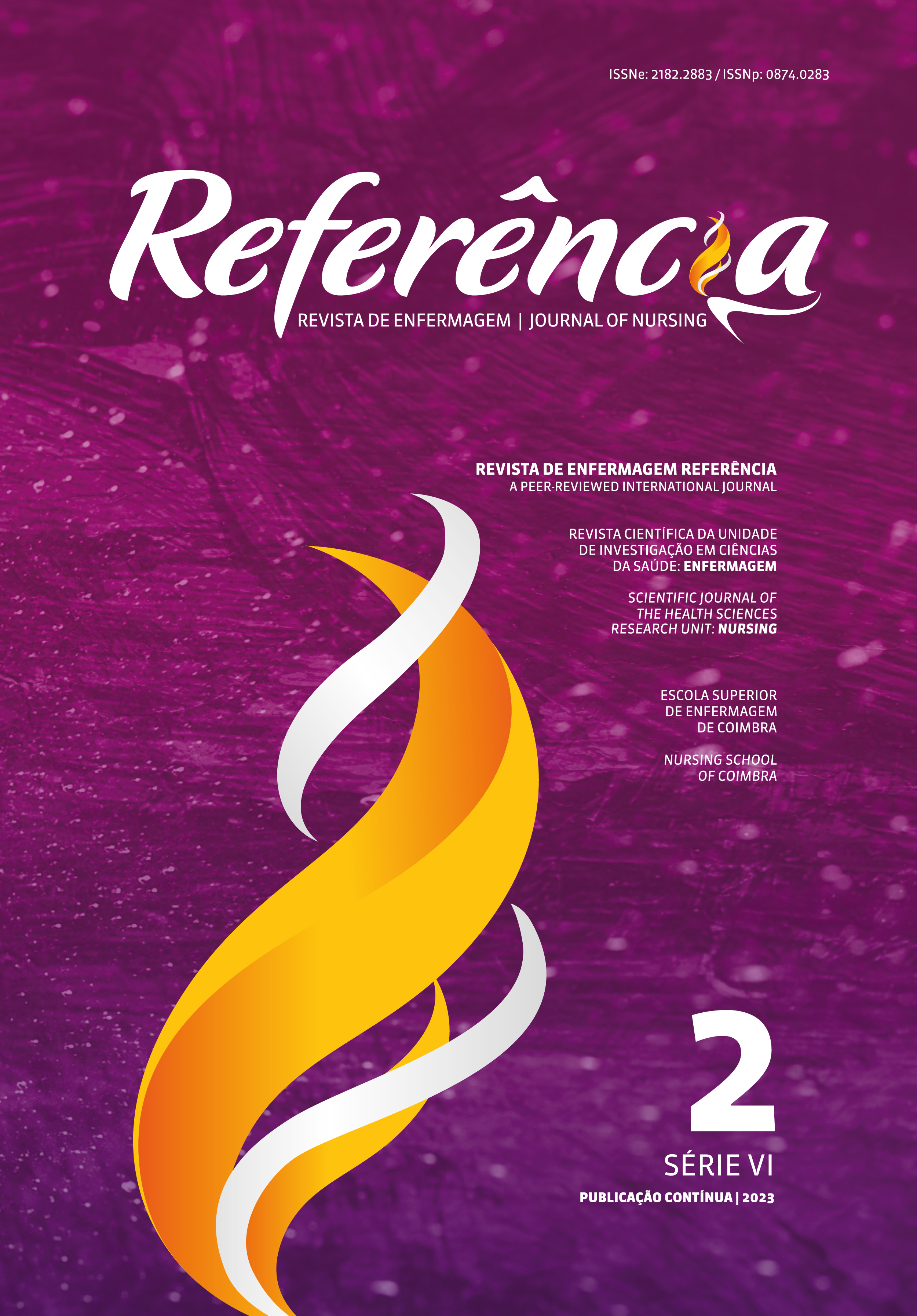Effectiveness of a nursing intervention in preventing violent behaviors among people with psychotic disorders in forensic settings
DOI:
https://doi.org/10.12707/RVI22034Keywords:
chizophrenia, psychosis, social skills, violence, forensic psychiatryAbstract
Background: Psychosis is characterized by distortions of thinking and perception, as well as inappropriate emotions. In forensic settings, psychiatric mental health nurses are responsible for preventing violent behaviors through psychotherapeutic interventions.
Objective: To characterize participants’ clinical situation based on the following variables: social performance, socially useful activities, personal and social relationships, disturbing and aggressive behavior, assertiveness, and early signs of aggression; and To assess the effectiveness of an intervention program for training social skills and reducing predictors of violence.
Methodology: Pre-experimental study with a one-group pretest-posttest design. The sample consisted of 15 patients admitted to forensic psychiatric wards.
Results: The intervention proved effective, with statistically significant changes in personal relationships, disturbing and aggressive behaviors, and early signs of aggression.
Conclusion: Training social skills and self-control improved participants’ clinical indicators and psychosocial rehabilitation and contributed to better (re)integrating them into their families and communities.
Downloads
References
Almeida, F., Moreira, D., Moura, H., & Mota, V. (2016). Psicose esquizofrénica e recidiva criminal: A importância dos programas de acompanhamento em ambulatório dos inimputáveis: Um estudo de caso. Livro de Resumos do VIII Simpósio Nacional de Investigação em Psicologia. Aveiro, Portugal: Instituto Superior da Maia.
Brissos, S., Pavalhã, F., Marques, J. G., Mexia, S., Carmo, A. L., Carvalho, M., Dias, C., Franco, J., D., Mendes, R., Zuzarte, P., Carita, A. I., Molodynski, A., & Figueira, M. L. (2012). The Portuguese version of the Personal and Social Performance Scale (PSP): Reliability, validity, and relationship with cognitive measures in hospitalized and community schizophrenia patients. Social Psychiatry and Psychiatric Epidemiology, 47(1), 1077-1086. https://doi.org/10.1007/s00127-011-0412-6
Decreto-Lei nº 48/95 do Ministério da Justiça. (1995) Diário da República: I série-A, nº 63. https://dre.pt/dre/detalhe/decreto--lei/48-1995-185720
Esbec, E., & Echeburúa, E. (2016). Violencia y esquizofrenia: Un análisis clínico-forense. Anuario de Psicología Jurídica, 26(1), 70-79. http://dx.doi.org/10.1016/j.apj.2015.12.001
Fluttert, F. A., Meijel, B. V., Leeuwen, M. V., Bjørkly, S., Nijman, H., & Grypdonck, M. (2011). The development of the Forensic Early Warning Signs of Aggression Inventory: preliminary finding toward a better management of inpatient aggression. Archives of Psychiatric Nursing, 25(2), 129-137. https://doi.org/10.1016/j.apnu.2010.07.001
Girolamo, G., Carrà, G., Fangerau, H., Ferrari, C., Gosek, P., Heitzman, J., Salize, H., Walker, M., Wancata, J., & Picchioni, M. (2019). European violence risk and mental disorders (EUVIORMED): A multi-centre prospective cohort study protocol. BioMedCentral Psychiatry, 19(410). https://doi.org/10.1186/s12888-019-2379-x
Gonçalves, C. M. (2018). Formação em habilidades de conversação para interação social de doente com esquizofrenia na Unidade de Reabilitação de Doentes Difíceis: Um estudo pré-experimental [Dissertação de mestrado não publicada]. Escola Superior de Enfermagem de Coimbra.
Korkmaz, S., Turhan, L., Izci, F., Saglam, S., & Atmaca, M. (2017). Sociodemographic and clinical characteristics of patients with violence attempts with psychotic disorders. Electronic Journal of General Medicine, 17(4), 94-98. https://doi.org/10.29333/ejgm/81738
Martins, F. F. (2015). Inimputabilidade por anomalia psíquica e respectivas consequências penais [Dissertação de mestrado não publicada]. Universidade Lusófona do Porto, Faculdade de Direito.
Melo-Dias, C. (2014). Habilidades de conversação em adultos com esquizofrenia [Tese de doutoramento, Universidade Católica Portuguesa, Instituto de Ciências da Saúde]. Repositório da Universidade Católica Portuguesa. http://hdl.handle.net/10400.14/19361
Melo-Dias, C., Gonçalves, C. M., Sousa, D. S., Pereira, G., Ferreira, J. C., Façanha, J. D. N., Rosa, A., Pinto, A., Carvalho, A. M., & J. C., Façanha, J. D. N., Rosa, A., Pinto, A., Carvalho, A. M., & Rodrigues, J. (s.d.). Vamos Conversar!: Projeto de investigação clínica em atividades de ocupação terapêutica na conversação e interação social. Escola Superior de Enfermagem de Coimbra.
Monahan, J., Vesselinov, R., Robbins, P., & Appelbaum, P. (2017). Violence to others, violent self-victimization, and violent victimization by others among persons with a mental illness. Psychiatric Services, 68(5), 516-519. https://doi.org/10.1176/appi.ps.201600135
Oliveira, G. C., & Valença, A. M. (2020). Institucionalização prolongada, transtornos mentais e violência: Uma revisão científica sobre o tema. Saúde e Sociedade, 29(4), 1-13. https://doi.org/10.1590/S0104-12902020190681
Olsson, H., & Schön, U. (2016). Reducing violence in forensic care: How does it resemble the domains of a recovery-oriented care? Journal of Mental Health, 25(6), 506-511. https://doi.org/10.3109/09638237.2016.1139075
Rampling, J., Furtado, V., Winsper, C., Marwaha, S., Lucca, G., Livanou, M., & Singh, S.P. (2016). Non-pharmacological interventions for reducing aggression and violence in serious mental illness: A systematic review and narrative synthesis. European Psychiatry, 34, 17-28. https://doi.org/10.1016/j.eurpsy.2016.01.2422
Regulamento nº 356/2015 da Ordem dos Enfermeiros. (2015). Diário da República: II Série, nº 122. https://dre.pt/dre/detalhe/regulamento/356-2015-67590900
Sampson, S., Edworthy, R., Völlm, B., & Bulten, E. (2016). Longterm forensic mental health services: An exploratory comparison of 18 European countries. International Journal of Forensic Mental Health, 15(4), 333-351. https://doi.org/10.1080/14999013.2016.1221484
Vagos, P., & Pereira, A. (2010). Escala de comportamento interpessoal: Adaptação para a língua portuguesa. Laboratório de Psicologia, 8(1), 37-49. https://doi.org/10.14417/lp.647
Völlm, B. A., Clarke, M., Herrando, V. T., Seppänen, A. O., Gosek, P., Heitzman, J., & Bulten, E. (2018). European Psychiatric Association (EPA) guidance on forensic psychiatry: Evidence based assessment and treatment of mentally disordered offenders. European Psychiatry, 51, 58-73. https://doi.org/10.1016/j.eurpsy.2017.12.007
World Health Organization (2010). Manual mhGAP de Intervenções para Transtornos Mentais, Neurológicos e por Uso de Álcool e outras Drogas para a Rede de Atenção Básica à Saúde. https://wp.ufpel.edu.br/ipab/files/2022/06/Manual_oms_mhgap.pdf






















